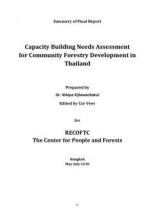/ library resources
Showing items 1 through 9 of 17.REDD+ is a proposed mechanism to make forests more valuable living and healthy than dead or damaged. Its advocates believe it could help fix a lot of persistent problems in forest management. Its opponents fear it will make these things worse.
Forests in Asia-Pacific are under threat. That's not a new story, though it becomes more important with every lost hectare and every family denied their means of survival.
Following Copenhagen, forestry stakeholders have raised many questions about the meaning of COP15 for people, forests, and forestry. FAO and RECOFTC brought together 12 experts in Bali to debate the issues and provide answers to a dozen key questions. This report summarizes the discussions.
In this report the results of an independent assessment of the needs for capacity building for the development of community forestry in Indonesia, are presented. Needs were assessed at the level of the institutional context of community forestry development, key organizations and individuals.
The objective of this report is mainly to identify priority issues associated with community forestry in different contexts in Thailand, and based from this, analyze capacities of key community forestry stakeholders and come up with recommendations for RECOFTC's Thailand Country Program
This brief summarizes progress made on REDD+ at the December 2009 Copenhagen climate talks, and discusses continuing challenges.
A single word can describe the history of forest management in the region: conflict. Too often this happens because local people are excluded from decision-making and the benefits of forest management. REDD+ is a proposed mechanism to make forests more valuable standing than destroyed.
This guide intends to assist forestry lecturers in Southeast Asia in developing their forest policy curricula with a particular focus on policy analysis.
Trends and Emerging Needs for 2020, Asia-Pacific Forestry Sector Outlook Study II
Paginering
Land Library Search
Through our robust search engine, you can search for any item of the over 73,000 highly curated resources in the Land Library.
If you would like to find an overview of what is possible, feel free to peruse the Search Guide.









